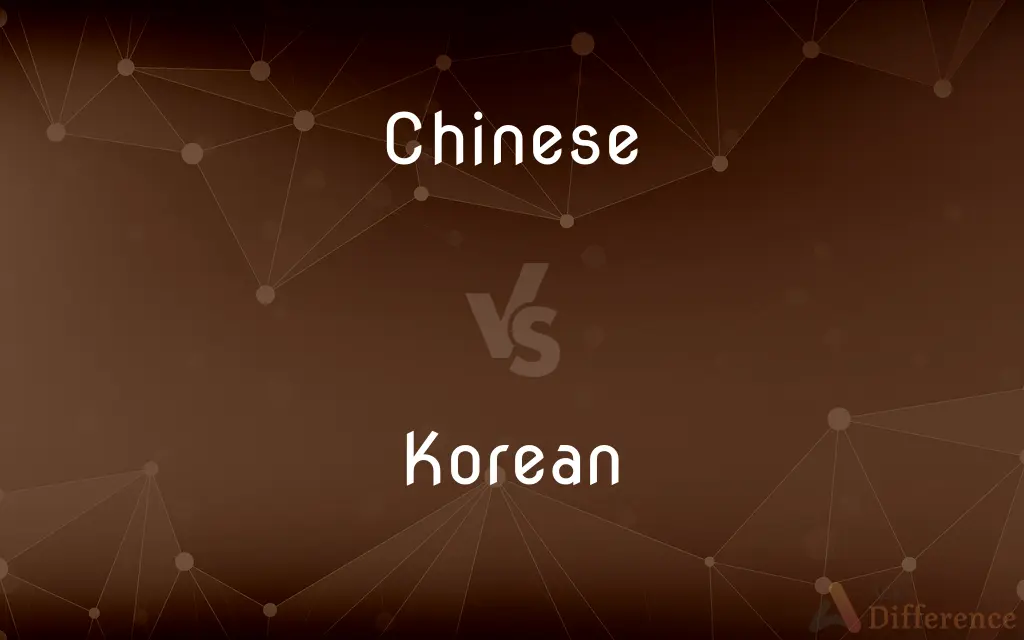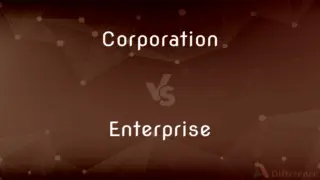Chinese vs. Korean — What's the Difference?
By Tayyaba Rehman & Fiza Rafique — Updated on March 30, 2024
Chinese is a Sino-Tibetan language with multiple dialects and a logographic writing system, while Korean belongs to the Koreanic language family, utilizing an alphabetic system called Hangul.

Difference Between Chinese and Korean
Table of Contents
ADVERTISEMENT
Key Differences
Chinese is one of the world’s oldest and most complex languages, with roots dating back thousands of years. It is a tonal language, meaning the pitch or tone in which a word is spoken can change its meaning. This language uses a logographic writing system, meaning characters represent words or morphemes. On the other hand, Korean, the official language of both South and North Korea, has its own unique writing system known as Hangul. Created in the 15th century, Hangul is an alphabetic system designed to be easy to learn and use.
While Chinese is spoken by over a billion people, making it one of the most spoken languages globally, Korean has a significantly smaller number of speakers, estimated to be around 75 million. This difference not only highlights the vast disparity in the number of speakers but also reflects the cultural and geopolitical influence each language and its speakers have.
Chinese characters (Hanzi) have influenced various Asian languages, including Korean. Historically, Korean used Hanja, Chinese characters, alongside Hangul, especially in formal and academic settings. Whereas, modern Korean predominantly uses Hangul due to its simplicity and efficiency in representing the sounds of the Korean language.
The phonetic systems of Chinese and Korean are markedly different. Chinese languages, particularly Mandarin, are tonal, where the meaning of a word can vary significantly with the pitch. Korean, however, is not tonal and places a greater emphasis on sentence structure and particles to convey meaning.
In terms of grammar, Korean is subject-object-verb (SOV) oriented, meaning the verb typically comes at the end of the sentence. Chinese, particularly Mandarin, follows a subject-verb-object (SVO) order, akin to that of English. This fundamental difference affects the way sentences are structured and understood in each language.
ADVERTISEMENT
Comparison Chart
Language Family
Sino-Tibetan
Koreanic
Writing System
Logographic (Characters)
Alphabetic (Hangul)
Tonal
Yes (e.g., Mandarin)
No
Historical Influence
Influenced many Asian languages, including Japanese and Korean through Hanzi
Initially used Hanja (Chinese characters) but now predominantly uses Hangul
Sentence Structure
Subject-Verb-Object (SVO)
Subject-Object-Verb (SOV)
Compare with Definitions
Chinese
Logographic system representing words or morphemes.
Chinese characters can have multiple pronunciations in different dialects.
Korean
Verb comes at the end of the sentence.
In Korean, I the store went is a correct sentence structure.
Chinese
Chinese, especially Mandarin, is tonal.
The Mandarin word for mother differs in tone from the word for horse.
Korean
The Korean alphabet, known for its scientific design.
Hangul was created to increase literacy in Korea.
Chinese
Includes Mandarin, Cantonese, Shanghainese, and more.
Cantonese is widely spoken in Hong Kong and Guangdong province.
Korean
Korean does not use tonal distinctions.
The meaning of Korean words does not change with pitch.
Chinese
The most widely spoken Chinese dialect.
Mandarin is the official language of China and Taiwan.
Korean
Unique language family with no close relatives.
Korean is linguistically distinct from Chinese and Japanese.
Chinese
One of the oldest languages, influencing many others.
Chinese has contributed thousands of words to the Korean and Japanese lexicons.
Korean
Uses Chinese characters for specific terms, mostly in formal texts.
Hanja is still taught in schools and used in certain contexts.
Chinese
Of or relating to China or its peoples, languages, or cultures.
Korean
A native or inhabitant of Korea.
Chinese
A native or inhabitant of China.
Korean
A person of Korean ancestry.
Chinese
A person of Chinese ancestry.
Korean
The language of the Koreans, possibly in the Altaic family.
Chinese
See Han1.
Korean
Of or relating to Korea or its people, language, or culture.
Chinese
The sole member of the Sinitic branch of the Sino-Tibetan language family, consisting of numerous languages and dialects such as Mandarin, Cantonese, Taiwanese, and Fujian.
Korean
Of or pertaining to Korea; as, Korean handicrafts; the Korean war.
Chinese
Any of the Sinitic varieties of speech spoken by the Chinese people.
Korean
A native or inhabitant of Korea who speaks the Korean language
Chinese
The official national language of China; Mandarin.
Korean
The Altaic language spoken by the Korean people
Chinese
Of or pertaining to China; peculiar to China.
Korean
Of or relating to or characteristic of Korea or its people or language;
Korean handicrafts
Chinese
A native or natives of China, or one of that yellow race with oblique eyelids who live principally in China.
Chinese
The language of China, which is monosyllabic.
Chinese
Any of the Sino-Tibetan languages spoken in China; regarded as dialects of a single language (even though they are mutually unintelligible) because they share an ideographic writing system
Chinese
A native or inhabitant of Communist China or of Nationalist China
Chinese
Of or pertaining to China or its peoples or cultures;
Chinese food
Chinese
Of or relating to or characteristic of the island republic on Taiwan or its residents or their language;
The Taiwanese capital is Taipeh
Common Curiosities
Why does Korean use Hangul instead of Chinese characters?
Hangul was developed to be a more accessible writing system for the Korean people, improving literacy rates.
Do Chinese and Korean have similar grammar?
No. Korean grammar is significantly different, especially in sentence structure, compared to Chinese.
Are Chinese and Korean written languages similar?
Historically, yes, due to the use of Chinese characters in Korean. Now, not much, as Korean primarily uses Hangul.
Can Chinese speakers understand Korean?
Generally, no. Despite some shared vocabulary due to historical borrowing, the languages are structurally and phonetically distinct.
How are new words formed in Chinese and Korean?
Chinese often combines existing characters. Korean can create new words by combining Hangul syllables or borrowing from English and other languages.
Are Chinese and Korean cultures similar?
There are historical influences, but each has distinct traditions, values, and social norms.
What is Hanja?
Hanja refers to Chinese characters used in Korean for specific terms, mainly in academic, legal, and sometimes media contexts.
How many tones are there in Chinese?
Mandarin, for example, has four main tones.
Is Hangul phonetic?
Yes, Hangul represents the sounds of Korean in an organized and systematic way.
Is Chinese harder to learn than Korean?
For English speakers, Chinese may be harder due to tones and characters, while Korean's Hangul is easier to grasp.
Is there a Chinese influence on Korean cuisine?
Yes, there are historical and cultural influences, but Korean cuisine has its own unique flavors and dishes.
Can learning Chinese help with learning Korean?
Somewhat, especially with vocabulary due to historical borrowings, but the grammar and writing systems are quite different.
What role did Chinese play in ancient Korea?
Chinese was the language of diplomacy, scholarship, and high culture in ancient Korea until the Joseon dynasty made Hangul prominent.
How do Korean and Chinese view each other historically?
Complex, with periods of cultural exchange and conflict. Today, there's a focus on economic cooperation and cultural exchange.
How do the educational systems in China and Korea differ in teaching their respective languages?
Both countries place a strong emphasis on mastering their language, but the methods and educational materials reflect their unique linguistic features and cultural values.
Share Your Discovery

Previous Comparison
Corporation vs. Enterprise
Next Comparison
Anticipate vs. ExpectAuthor Spotlight
Written by
Tayyaba RehmanTayyaba Rehman is a distinguished writer, currently serving as a primary contributor to askdifference.com. As a researcher in semantics and etymology, Tayyaba's passion for the complexity of languages and their distinctions has found a perfect home on the platform. Tayyaba delves into the intricacies of language, distinguishing between commonly confused words and phrases, thereby providing clarity for readers worldwide.
Co-written by
Fiza RafiqueFiza Rafique is a skilled content writer at AskDifference.com, where she meticulously refines and enhances written pieces. Drawing from her vast editorial expertise, Fiza ensures clarity, accuracy, and precision in every article. Passionate about language, she continually seeks to elevate the quality of content for readers worldwide.
















































